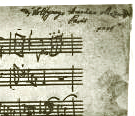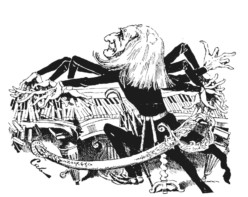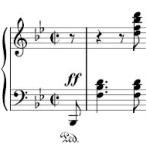Paris, 2014 Arnold Schoenberg gave Rudolf Serkin an assignment. (This story is hearsay; worthy of attention, in my opinion.) Consider the opening of Mozart's A-Minor piano sonata, Schoenberg asked Serkin. What is the right instrumentation for this music, if it were to be scored for orchestral instruments? Mozart: Sonata in A Minor, KV 310 (300d) Serkin's answer included an oboe playing the upper melody line, and strings taking the … [Read more...]
“large capable hands”
Every hand is different. Often large hands or hands with wide reach are thought to be an advantage in piano playing. In general, hands are getting bigger as bodies do. That makes some big stretches in old keyboard music more accessible, and less risky. Very wide fingers are a difficulty. It may be impossible to play in between the piano's black keys -- as it was for Walter Gieseking. We know that a few players of the modern piano (Daniel … [Read more...]
One Hand
From the school's library I checked out again the copy of Messiaen's Le merle noir (The Blackbird) that I used last fall when I played the piece with Paula Robison. Since then, many markings were made in the piano part. I don't mark anything in the scores I use, but when I opened the music again there were all the things pianists write: dark circles drawn around printed dynamic markings, fingering, penciled-in lines showing correspondences … [Read more...]
Tail wind
My flight to Los Angeles took over six hours. Coming back to the east coast with a strong tail wind making the flight easier and faster, the flight lasted only four hours and twelve minutes. Rudolf Serkin is sometimes credited with having said: "Playing the piano is easy, if everything goes well." Raising the question, "What about when it doesn't go well?" Then it's harder, then it takes more fuel. Then, you need to be an "expert," a "master," a … [Read more...]




